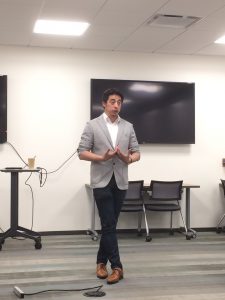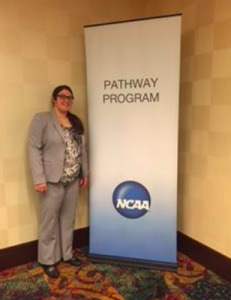Tuesday, June 27, 2017 | 5:30 pm-7:30 pm
Cask Bar
167 E 33rd Street
New York, NY 10016
For more details, visit the registration page
Tuesday, June 27, 2017 | 5:30 pm-7:30 pm
Cask Bar
167 E 33rd Street
New York, NY 10016
For more details, visit the registration page
 Sport Management alumnus Mikio Yoshimura, who currently works as the Asian Business Development Specialist for the Boston Red Sox, served as the guest speaker at a Brown Bag Luncheon in Boston on Tuesday, June 13.
Sport Management alumnus Mikio Yoshimura, who currently works as the Asian Business Development Specialist for the Boston Red Sox, served as the guest speaker at a Brown Bag Luncheon in Boston on Tuesday, June 13.
The event, put on by the Japan Society of Boston, was titled “Japan and the Red Sox: A View from Inside.” During the luncheon, Yoshimura shared experiences about all the work that the Red Sox organization and Fenway Park have done with Japan.
UConn Sport Management congratulates Yoshimura for this accomplishment and looks forward to seeing all that he will achieve in the future with this organization.
Student Feature
Isaiah Jacobs – Program Leader (Public Ally AmeriCorps), Current Graduate Student in UConn Sport Management Program
“Throughout our nation’s history, lasting social change has always resulted from the courageous acts of many, not just the inspiration of the few. “
From 2014 to 2016, I spent my time as a public ally with the AmeriCorps Public Ally service organization in partnership with UConn Husky Sport. Public Allies is a national movement grounded in the conviction that everyone has the ability to be a leader. The organization prides itself in believing that everyone truly has the power to make a difference, and works to inspire individuals to believe in themselves, step up and act. We provided service under the mission to create an equitable society and to foster the diverse leadership necessary to sustain it. We work to change the face and practice of leadership in communities across the country by demonstrating our conviction that everyone can and should lead, and that lasting social change results when citizens of all backgrounds step up, take responsibility and come together.
A vital aspect of working as a Public Ally was the process of constructing and implementing a team service project held to benefit the community that we were stationed in. Luckily, I was stationed right in my hometown of Hartford, Connecticut. It was a pleasure giving back to the community that I grew up in and held so close to my heart.
To help fund this project, we decided as a group to host a 3-on-3-basketball tournament. Though the event was focused around it, basketball was simply acting as the driving force to get people in the door – this event was bigger than sports. It was an opportunity to bring local organizations together and partner with one another to host teams and enjoy the company of the community. I began to realize how successful our event was when people started asking when the next one was – people who were not concerned with the sport itself, but what that sport is able to produce. In holding this event, we exhibited the power that sport has to unite people and bring happiness to all of those immersed in its culture.
Norwich Bulletin (Sport Management major Rachel Hill to join National Women’s Soccer League following graduation)
The Harvard Crimson (Laura Burton, associate professor of sport management, quoted)
 Story written by: Jackie Kelly
Story written by: Jackie Kelly
After graduating from the University of Hartford, I was able to accept a position with the NCAA National Office in Indianapolis, IN. The NCAA offers a postgraduate cohort based internship program that works with various departments throughout the national office. I worked as an intern for the Leadership Development department, which was responsible primarily for creating professional development programming for student-athletes, coaches, interns, graduate assistants and administrators across the NCAA membership.
Many of my daily tasks were focused on preparing for our programs. While working on site, I facilitated activities, panels and group discussions. I really enjoyed traveling to each of the programs, my favorite of which was the Pathway Program. This specific program is a yearlong professional development series held for senior level administrators aspiring to become athletic directors. I spent the majority of my time working on logistics, but was able to sit in on mock interviews and media training sessions as well. We were also able to take site visits to Georgia State University, Georgia Tech, Emory and Clayton State University. During our time at these universities, the participants met with presidents, athletics directors and other current staffers. I was able to sit in on some of these conversations and presentations, which was extremely informative and allowed me to gain some valuable experience.
Over the course of that year I was able to create memories and relationships that I know will last a lifetime. My fellow interns in my cohort were and will always be like my family. Having been granted the opportunity to understand the NCAA from a national, internal perspective so soon after actually being a student athlete was a once in a lifetime experience that I will always treasure.
The Daily Campus captures the latest round of lecture series led by Sport Management students.